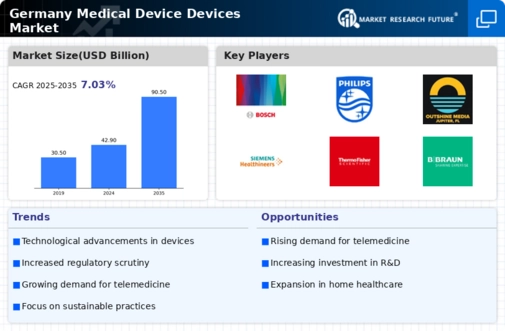Investment in Healthcare Infrastructure
Investment in healthcare infrastructure is a vital driver for the germany medical device market. The German government has committed to enhancing healthcare facilities and services, which includes upgrading medical equipment and technology. In recent years, public spending on healthcare has increased, with projections indicating a rise to over 12% of GDP by 2026. This investment not only improves the quality of care but also creates opportunities for medical device manufacturers to supply advanced technologies. Furthermore, the emphasis on digitalization within the healthcare sector is likely to lead to increased demand for innovative medical devices that integrate with electronic health records and telehealth solutions. As healthcare infrastructure continues to evolve, it is expected to provide a conducive environment for the growth of the germany medical device market.
Regulatory Environment and Market Access
The regulatory environment in Germany significantly influences the dynamics of the germany medical device market. The Medical Device Regulation (MDR) implemented by the European Union has established stringent requirements for the approval and market access of medical devices. While these regulations aim to ensure patient safety and product efficacy, they also pose challenges for manufacturers, particularly small and medium-sized enterprises. Compliance with these regulations requires substantial investment in quality management systems and clinical evaluations. However, the rigorous regulatory framework can also serve as a catalyst for innovation, as companies strive to meet the high standards set forth. As a result, the regulatory landscape shapes the competitive environment and market entry strategies within the germany medical device market, ultimately influencing the growth trajectory of the sector.
Technological Advancements and Innovation
Technological advancements play a crucial role in shaping the germany medical device market. Innovations in areas such as minimally invasive surgery, telemedicine, and wearable health monitoring devices are transforming patient care and treatment methodologies. The German medical device sector is characterized by a strong emphasis on research and development, with companies investing approximately 7% of their revenue into innovative technologies. This commitment to innovation not only enhances the efficacy of medical devices but also improves patient outcomes. Moreover, the integration of artificial intelligence and machine learning into medical devices is expected to revolutionize diagnostics and treatment protocols. As these technologies continue to evolve, they are likely to drive significant growth within the germany medical device market, attracting both domestic and international investments.
Rising Health Awareness and Preventive Care
Rising health awareness among the German population is a significant driver for the germany medical device market. As individuals become more informed about health issues and the importance of preventive care, there is an increasing demand for diagnostic and monitoring devices. This trend is reflected in the growing popularity of home healthcare devices, such as blood pressure monitors and glucose meters, which empower patients to take charge of their health. Additionally, public health campaigns and initiatives aimed at promoting healthy lifestyles are further contributing to this shift. The German government has also been proactive in supporting preventive healthcare measures, which aligns with the increasing consumer demand for medical devices that facilitate early detection and management of health conditions. Consequently, this heightened health awareness is likely to bolster the growth of the germany medical device market.
Aging Population and Increased Healthcare Demand
The aging population in Germany is a pivotal driver for the germany medical device market. As the demographic shifts towards an older age group, the demand for medical devices, particularly those related to chronic diseases and mobility aids, is expected to rise. By 2030, it is projected that over 20% of the German population will be aged 65 and older, leading to an increased prevalence of age-related health issues. This demographic trend necessitates advanced medical technologies, thereby propelling the growth of the medical device sector. Furthermore, the German healthcare system is adapting to these changes by investing in innovative medical solutions, which further stimulates the market. The combination of an aging population and the corresponding healthcare demand creates a robust environment for the expansion of the germany medical device market.



















